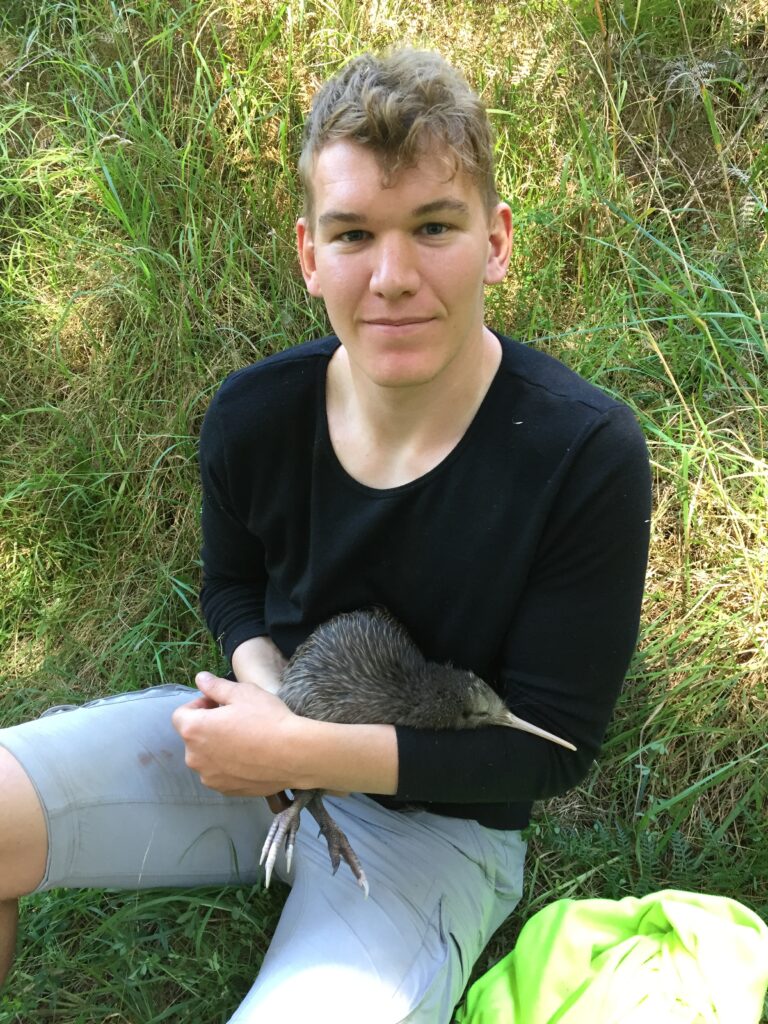
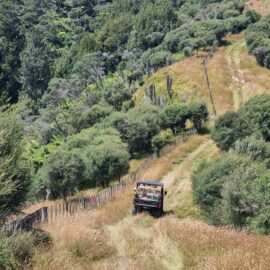
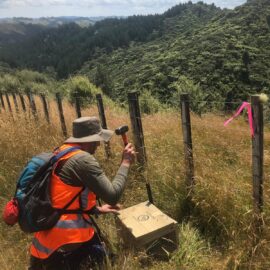
CORE PROJECT - 18,000 HECTARES
ETEC’s pest management program which includes 18,000 hectares of mustelid control in East Taranaki and 1,000 hectares of intensive rat and possum ground control in the Pouiatoa (within the rohe of both Ngāti Maru and Ngāti Mutunga) provides protection for native taonga such as kiwi, kōkako, New Zealand Long Tailed Bat and other native species to survive.
Our country’s national kiwi recovery plan indicates that New Zealand’s total kiwi population is declining at 2% pa. ETEC’s project is significantly contributing to recovery of the western North Island brown kiwi in New Zealand. Our project has an estimated western brown kiwi population of 1 pair per 12.5-15 hectares. In 2018 we translocated 20 kōkako into the project area. The goal of this was to establish a self-supporting population which can contribute to the wider kōkako recovery plan and the restoration of the overall ecological system.
Our predator work consists of over 1300 DOC200 traps and 630 DOC250 traps that target mustelids, and over 1000 resetting traps (A12s and A24s) that target rats and possums. Ground based toxin operations are also undertaken in the Pouiatoa Conservation Area to help suppress rats and possums where the introduced kōkako have settled and are successfully breeding. Goat control is also important for the long term health of the forest as well as regeneration in the understory, thanks to the support The Department of Conservation goat control is also undertaken.
ETEC takes a science-based approach to conservation work, by using several indicator species to demonstrate the effectiveness of our pest control programmes. While pest control is at the core of our work to restore the ecosystem, we monitor kiwi, kōkako, and other species to indicate whether we are successfully reducing predation rates on these species, leading to increased native fauna in the area. We also conduct annual monitoring of rat and possum populations to inform our future pest control approaches, and adapt our pest control based on these results.
The Trust was formed in 2005 by a group of landowners dedicated to protecting kiwi habitat through active pest management. It has now grown to be an accountable, professional organisation that is endorsed by both the Department of Conservation and the Taranaki Regional Council. Today, ETEC is one of the largest community environmental projects in New Zealand. Our project size enables us to connect and engage with a wide range of communities, schools, contractors, landowners and Iwi groups from the following regions; Okoki, Ureti, Matau, Inglewood, Stratford, Hawera, New Plymouth and Te Wera.
Our project takes a collaborative approach ensuring that our Trust is sharing our knowledge, expertise, skills, and also taking the opportunity to learn from others to ensure we achieve long term conservation success and goals. Our Trust works alongside the Department of Conservation, Taranaki Regional Council, other conservation groups and organisations, as well as with funders and supporters. The Trust believes to continue the long term success of the project collaboration is key. DOC has been working on the feasibility of the East Taranaki Corridor, and our project sits in the heart of this along with work being done by local Iwi. The Trust is working alongside DOC and local Iwi to establish this Eastern corridor which will act as a refuge for native species, and one where pest species are kept at low levels. This will not only provide a corridor of national conservation significance but provide an opportunity to build and develop a strong conservation workforce within Taranaki.
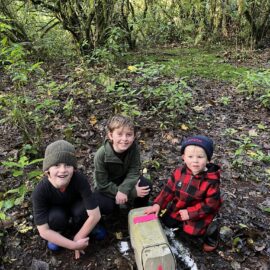

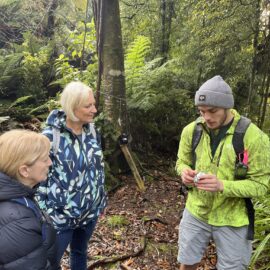
Everett Park
Everett Park Scenic Reserve is 8km east of Inglewood and is the largest reserve on the Taranaki ring plain outsideof the region’s national park, Te Papakura o Taranaki. Everett Park is considered to be an outstanding remnant example of the podocarp forest that once dominated the Taranaki landscape, it was set aside by the Crown in 1889 and made a reserve in 1919. Since then the 85ha reserve has been one of Taranaki’s prime recreational assets, with generations of locals enjoying Everett Park for such activities as bush walking, picnicking, camping, andfishing and swimming in the Manganui River. Thanks to the protection by the Crown 132 years ago, most of Everett Park has never been logged so is in its original natural state, but its forest has suffered from browsing by possums, and native bird life has been under continual threat from mustelids, rodents and feral cats.
In February 2022 ETEC took over the community agreement of Everett Park in partnership with The Department of Conservation and Pukerangiora Hapū. In September to December 2022 thanks to the support of Iwi, Todd Energy, the community and Lotteries Heritage Fund over 300 traps were installed in the Reserve to target rats, possums, and mustelids, and almost 8 km of tracks were cut and marked within Everett Park for these traplines to be easily walked.
A baseline monitor was carried out before the traps were deployed within the Reserve (September 2022), and monitoring was completed on the same monitoring lines by our field team and volunteers in September 2023. Monitoring results showed that possum numbers had declined from 18% to 8%, and rats had declined from 72% to 8%. These are incredible results, and not something that we were expecting after just a year of trapping. We didn’texpect to see a change in the birdlife yet either, but have been hearing and seeing more birds over this time, especially the shining cuckoo in spring.
The Trust’s biodiversity plan focuses on pest control through an adaptive management approach, with monitoring of pest and native species to ensure there are biodiversity gains. Monitoring is carried out for rats using tracking tunnels, possums using wax tags, and camera trapping for both rats and possums. Our Trust takes an adaptive management approach and changes our control methods as needed.
It is important that we continue this important intensive pest control programme in Everett Park. Reducing the high pest levels in the area will help relieve predation pressure on the native bird populations inhabiting the Reserve. The Trust will continue to work alongside Hapū, the community, our partners, local kura and tamariki to work together to help protect and restore the habitat and ecosystem within this area, while improving public access and awareness, while educating and engaging the community on the importance of protecting and restoring our native flora and fauna, as well as providing protection to an area of high importance to mana whenua and the community.
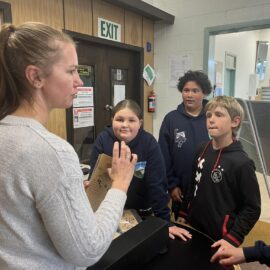
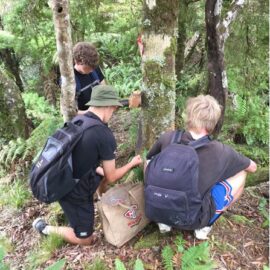
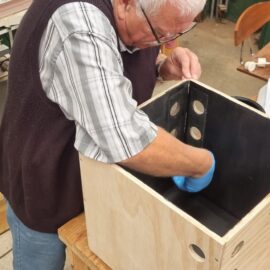
Education and Volunteer Programmes
Our educational and volunteer programs, including the kaitiakitanga youth program for local schools, provide hands-on conservation experiences and foster community involvement. Our kaitiakitanga youth programme works with 9 local schools (Kaimata, Ratapiko, Norfolk, St Patricks Inglewood, Huirangi, Waitoriki, St Joseph’s Waitara, Waitara Central School and Egmont Village School) that educates the next generation on the importance of pest control and restoring New Zealand’s native biodiversity. Students have had the opportunity to have hands on experience out in the bush planting trees, checking traps, and learning about pest and native monitoring tools. Our Trust also has taken the lead over the last few years to bring together a number of conservation organisations such as DOC, Taranaki Regional Council, local Iwi conservation projects, Rotokare and Taranaki Kiwi Trust to run workshops at local schools to teach students about conservation work.
Our Trust also plays an active role in helping to develop our future generations by providing them opportunities to learn about pest control and work alongside our team. Our staff are also using their skills to train and support local Inglewood High student’s as part of their gateway program. Gateway is designed to support school students’ transition into the workforce by offering them workplace learning while at secondary school.
The Trust provides a place for volunteers to engage and connect with the environment, and the Trust’s volunteer network has been the core to its long-term success. Our volunteer network, contributing over 2000 hours last financial year, is crucial to our success. Our volunteer programmes take place at either our Inglewood office, the Pouiatoa forest or Everett Park Reserve. The Trust has recently installed more than 300 traps within Everett Park to give the park a new lease on life and provide our growing community with a place to be actively involved. We have 7 volunteers plus Tupu ā nuku rangatahi checking these traps on a regular basis. ETEC values the input of our volunteers, and wouldn’t be able to achieve our outstanding results in conservation without their contribution.
If you are interested in learning more about volunteer or education opportunties give us a call.
Other Projects
Freshwater
When we have the resources we will be studying what’s in our rivers and creeks. We have a fantastic list of species which have been spotted.
Plant life
A myriad of plant with some unique fauna present within the project area, identifying and preserving is one of our further agendas for conservation within the area.
Research
We are always on the lookout for research capabilities, whether from individual researchers or universities wishing to use or project area for their projects. For further information, please contact the team.
